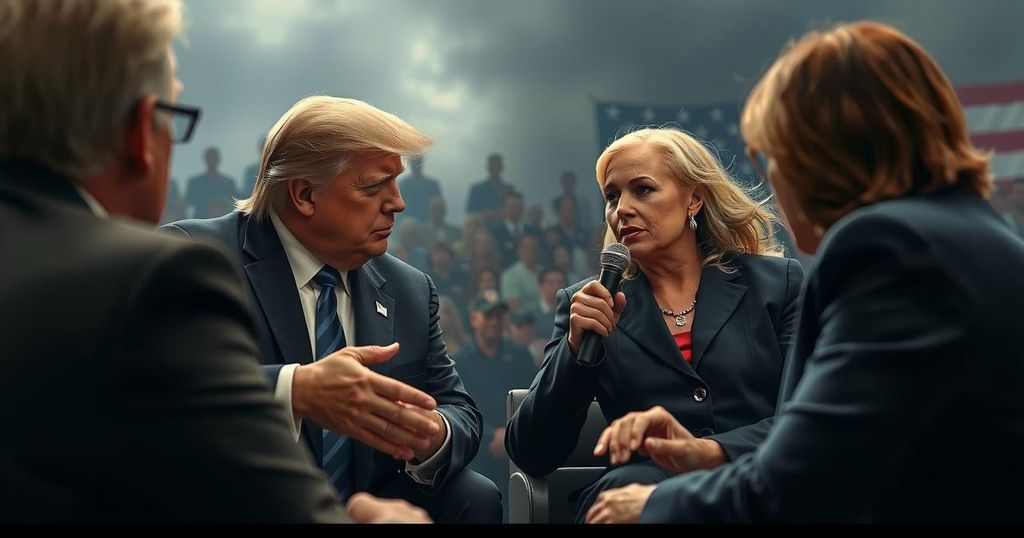Liz Cheney Critiques Trump as Harris Campaign Targets Key Republican Votes in Wisconsin
Liz Cheney is featured in new radio ads for the Harris campaign in Wisconsin, criticizing Donald Trump and advocating for Kamala Harris. Cheney emphasizes the risks associated with Trump’s foreign policy, while Charlie Sykes highlights the election as a pivotal moment for democracy. Polls suggest a close race, and despite efforts to appeal to Republicans, Trump’s campaign dismisses Cheney’s support as irrelevant.
In a strategic move ahead of the upcoming election, the campaign for Vice President Kamala Harris is enlisting the support of former House Representative Liz Cheney, R-Wyo., to appeal to Republican voters in Wisconsin, a crucial battleground state. This initiative involves the release of new radio advertisements featuring Cheney and political commentator Charlie Sykes, which directly criticize former President Donald Trump while advocating for Harris. In one of the ads, Liz Cheney, who identifies as a Ronald Reagan conservative and has never voted Democrat, emphasizes the unprecedented danger she perceives in Trump’s foreign policy proposals. “What Donald Trump is proposing in terms of withdrawing from NATO, welcoming Vladimir Putin to attack our NATO allies, praising President Xi of China… is a risk we just simply cannot take as a nation,” she declares, underlining her belief that Harris represents the strong leadership needed to maintain American freedom and security. Charlie Sykes, a former conservative radio host and editor of The Bulwark, echoes Cheney’s sentiments in a separate ad by stating, “This election is not normal… It is about democracy, the rule of law, character, and whether or not America will continue to be a shining city on a hill to the rest of the world.” He cites former Trump Chief of Staff John Kelly’s recent statements comparing Trump to a fascist, further solidifying the campaign’s narrative against Trump. With just days remaining before Election Day on November 5, polls indicate a tight race between Trump and Harris, compelling the Harris-Walz campaign to increase outreach to Republicans and independents. Cheney and her father, former Vice President Dick Cheney, have been notable figures supporting Harris, along with endorsements from prominent Wisconsin Republicans, signaling a potential shift in voter perspectives. Despite this targeted outreach, the Trump campaign has dismissed efforts to attract Republican voters as futile. Trump criticized Cheney as “a stupid war hawk” in response to her endorsement of Harris, while campaign communications director Steven Cheung labeled her a “stone-cold loser” seeking attention. As the election draws near, it remains to be seen how Cheney’s and Sykes’ initiatives will affect voter turnout and sentiment in Wisconsin.
The article discusses a significant political maneuver by Vice President Kamala Harris’s campaign as it seeks to position itself favorably among Republican voters in Wisconsin ahead of a pivotal election. Liz Cheney, a notable figure of the Republican party who lost her seat in Congress to a Trump ally, serves as a key spokesperson against Trump’s influence on American governance. The involvement of former conservative voices like Charlie Sykes illustrates an effort to frame the election as a choice between traditional Republican values and the perceived authoritarian tendencies of Trump. This context is critical as multiple polls suggest a close race, making Wisconsin a focal point for both parties.
The Harris campaign’s strategy to harness the support of Liz Cheney and other Republicans signifies a bold approach in a contentious election landscape. By emphasizing themes of democracy and traditional conservative values, Cheney and Sykes aim to sway Republican voters in Wisconsin against Trump. However, as reactions from the Trump campaign reveal, these efforts may also intensify partisan divisions, with the former president and his associates continuing to rally loyalists. This interplay of alliances and opposition will likely play a crucial role in determining the outcome of the election.
Original Source: www.foxnews.com




Post Comment